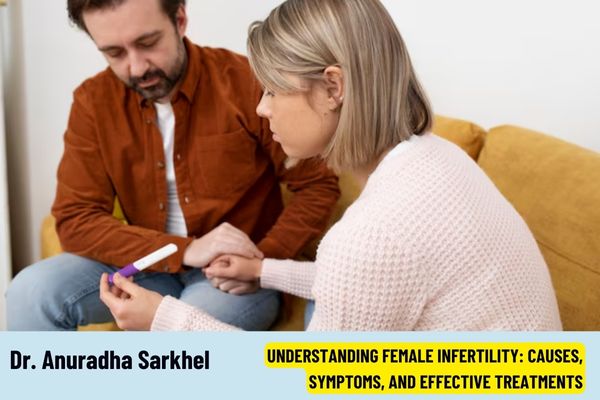Understanding Female Infertility: Causes, Symptoms, and Effective Treatments with Dr. Anuradha Sarkhel
Infertility is a deeply emotional and challenging journey for many women. While the desire to have a child is universal, some couples face difficulties in conceiving. In this blog, Dr. Anuradha Sarkhel, a renowned gynecologist in Kolkata, will help you understand the causes, symptoms, and the most effective treatments for female infertility. By breaking down the complexities of infertility, Dr. Sarkhel aims to provide clarity and hope to women seeking to build their families.
What is Female Infertility?
Female infertility refers to a woman’s inability to conceive after one year of regular, unprotected intercourse. It can result from a variety of factors affecting different parts of the reproductive system, such as the ovaries, fallopian tubes, uterus, or even hormonal balance. Infertility can be a result of age, lifestyle factors, underlying medical conditions, or genetic factors.
Common Causes of Female Infertility
- Ovulation Disorders:
Ovulation is the process where an ovary releases an egg for fertilization. Any disruption in this process can lead to infertility. Conditions like Polycystic Ovary Syndrome (PCOS) or hypothalamic dysfunction can cause irregular or absent ovulation. - Fallopian Tube Blockage or Damage:
The fallopian tubes carry the egg from the ovaries to the uterus. Blocked or damaged fallopian tubes can prevent the egg from meeting the sperm, causing infertility. Pelvic inflammatory disease (PID), endometriosis, or previous abdominal surgery can contribute to tubal issues. - Endometriosis:
Endometriosis occurs when tissue similar to the uterine lining grows outside the uterus, causing scarring, adhesions, and fertility problems. It is one of the leading causes of female infertility. - Uterine Conditions:
Structural issues such as fibroids, polyps, or congenital uterine abnormalities can impact implantation, making it difficult for a fertilized egg to attach to the uterine lining. - Age-related Factors:
A woman’s fertility naturally declines with age, especially after 35. Reduced ovarian reserve and quality of eggs are common reasons for infertility in older women. - Hormonal Imbalances:
Conditions such as thyroid disorders, prolactin issues, or luteal phase defects can interfere with ovulation and lead to infertility. - Unexplained Infertility:
In some cases, despite normal test results and clear reproductive anatomy, a woman may still face difficulty in conceiving. This is called unexplained infertility and may be linked to factors that are difficult to detect.
Symptoms of Female Infertility
While infertility is typically diagnosed after failing to conceive for a year, there are some common symptoms that may indicate an underlying issue:
- Irregular Menstrual Cycles: This could be an indication of ovulation issues.
- Painful Periods or Intercourse: Severe pain during periods or sex may signal conditions like endometriosis or fibroids.
- Hormonal Imbalances: Symptoms like excessive hair growth (hirsutism), acne, or sudden weight gain may point to conditions like PCOS.
- Abnormal Vaginal Discharge: This could be a sign of infections or health issues affecting the reproductive organs.
- Previous Miscarriages: Recurrent pregnancy loss can sometimes indicate fertility problems.
Effective Treatments for Female Infertility
1. Ovulation Induction:
For women with ovulation issues, medications like clomiphene citrate (Clomid) or letrozole can stimulate the ovaries to release eggs. In some cases, injectable hormones may be used to enhance ovulation.
2. Intrauterine Insemination (IUI):
This procedure involves placing sperm directly into the uterus to increase the chances of fertilization, often used in combination with ovulation induction drugs.
3. In Vitro Fertilization (IVF):
In IVF, eggs are harvested from the ovaries, fertilized in a lab, and the resulting embryos are then implanted into the uterus. IVF is one of the most successful treatments for infertility, especially for women with tubal damage or unexplained infertility.
4. Surgery:
In cases where there are uterine fibroids, endometriosis, or blocked fallopian tubes, surgical options can help restore fertility. Laparoscopy and hysteroscopy are minimally invasive procedures often used to treat such conditions.
5. Egg or Sperm Donation:
For women with a low egg reserve or men with low sperm count, donor eggs or sperm may be considered. The eggs or sperm from a donor are used in IVF procedures.
6. Lifestyle Changes:
Adopting a healthy lifestyle can improve fertility. Maintaining a healthy weight, avoiding smoking and alcohol, and managing stress are all vital for enhancing fertility.
The Role of Dr. Anuradha Sarkhel in Female Infertility Treatment
Dr. Anuradha Sarkhel is a highly experienced gynecologist specializing in fertility issues. With a compassionate approach and expert knowledge, Dr. Sarkhel offers personalized treatment plans tailored to each patient’s unique situation. Whether it’s ovulation induction, IVF, or surgery, Dr. Sarkhel ensures that women receive the most effective treatment options available.
Her clinic is equipped with the latest technology and treatments, offering comprehensive care that includes counseling, diagnostic testing, and fertility treatments. Dr. Sarkhel is committed to guiding women through their infertility journey with empathy and professionalism, helping them achieve their dream of parenthood.
Conclusion
Female infertility can be a difficult and emotional challenge, but it is important to remember that there are various treatment options available. With the right guidance and care from a specialist like Dr. Anuradha Sarkhel, many women can overcome infertility and fulfill their dreams of becoming mothers.
If you are struggling with infertility or suspect you may have a fertility-related issue, don’t hesitate to schedule a consultation with Dr. Anuradha Sarkhel. Understanding the causes, addressing symptoms, and seeking treatment early on can dramatically improve your chances of conception and lead to a healthier, happier life.

